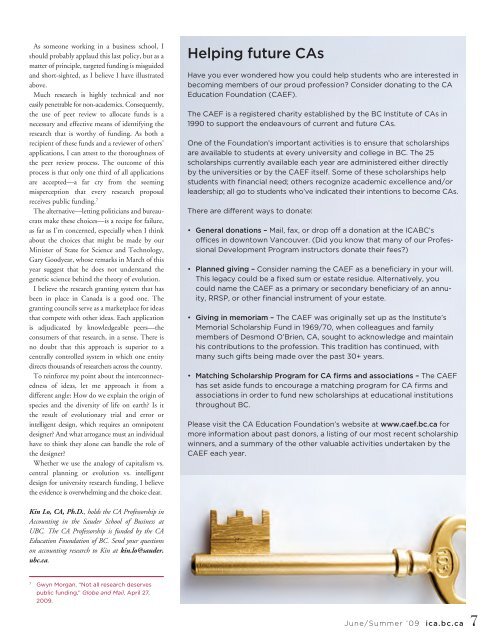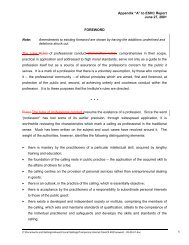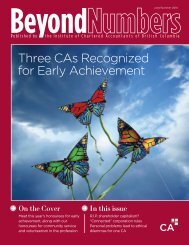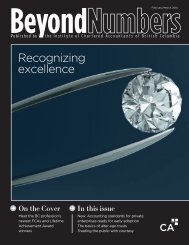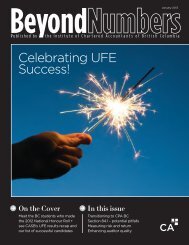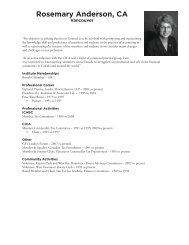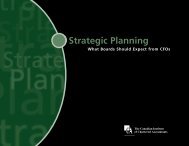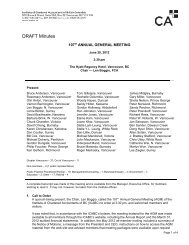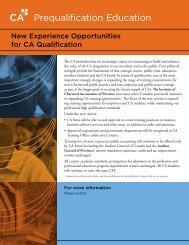ICABC Awards for Early Achievement - Institute of Chartered ...
ICABC Awards for Early Achievement - Institute of Chartered ...
ICABC Awards for Early Achievement - Institute of Chartered ...
You also want an ePaper? Increase the reach of your titles
YUMPU automatically turns print PDFs into web optimized ePapers that Google loves.
As someone working in a business school, Ishould probably applaud this last policy, but as amatter <strong>of</strong> principle, targeted funding is misguidedand short-sighted, as I believe I have illustratedabove.Much research is highly technical and noteasily penetrable <strong>for</strong> non-academics. Consequently,the use <strong>of</strong> peer review to allocate funds is anecessary and effective means <strong>of</strong> identifying theresearch that is worthy <strong>of</strong> funding. As both arecipient <strong>of</strong> these funds and a reviewer <strong>of</strong> others’applications, I can attest to the thoroughness <strong>of</strong>the peer review process. The outcome <strong>of</strong> thisprocess is that only one third <strong>of</strong> all applicationsare accepted—a far cry from the seemingmisperception that every research proposalreceives public funding. 7The alternative—letting politicians and bureaucratsmake these choices—is a recipe <strong>for</strong> failure,as far as I’m concerned, especially when I thinkabout the choices that might be made by ourMinister <strong>of</strong> State <strong>for</strong> Science and Technology,Gary Goodyear, whose remarks in March <strong>of</strong> thisyear suggest that he does not understand thegenetic science behind the theory <strong>of</strong> evolution.I believe the research granting system that hasbeen in place in Canada is a good one. Thegranting councils serve as a marketplace <strong>for</strong> ideasthat compete with other ideas. Each applicationis adjudicated by knowledgeable peers—theconsumers <strong>of</strong> that research, in a sense. There isno doubt that this approach is superior to acentrally controlled system in which one entitydirects thousands <strong>of</strong> researchers across the country.To rein<strong>for</strong>ce my point about the interconnectedness<strong>of</strong> ideas, let me approach it from adifferent angle: How do we explain the origin <strong>of</strong>species and the diversity <strong>of</strong> life on earth? Is itthe result <strong>of</strong> evolutionary trial and error orintelligent design, which requires an omnipotentdesigner? And what arrogance must an individualhave to think they alone can handle the role <strong>of</strong>the designer?Whether we use the analogy <strong>of</strong> capitalism vs.central planning or evolution vs. intelligentdesign <strong>for</strong> university research funding, I believethe evidence is overwhelming and the choice clear.Helping future CAsHave you ever wondered how you could help students who are interested inbecoming members <strong>of</strong> our proud pr<strong>of</strong>ession? Consider donating to the CAEducation Foundation (CAEF).The CAEF is a registered charity established by the BC <strong>Institute</strong> <strong>of</strong> CAs in1990 to support the endeavours <strong>of</strong> current and future CAs.One <strong>of</strong> the Foundation’s important activities is to ensure that scholarshipsare available to students at every university and college in BC. The 25scholarships currently available each year are administered either directlyby the universities or by the CAEF itself. Some <strong>of</strong> these scholarships helpstudents with financial need; others recognize academic excellence and/orleadership; all go to students who’ve indicated their intentions to become CAs.There are different ways to donate:• General donations – Mail, fax, or drop <strong>of</strong>f a donation at the <strong>ICABC</strong>’s<strong>of</strong>fices in downtown Vancouver. (Did you know that many <strong>of</strong> our Pr<strong>of</strong>essionalDevelopment Program instructors donate their fees?)• Planned giving – Consider naming the CAEF as a beneficiary in your will.This legacy could be a fixed sum or estate residue. Alternatively, youcould name the CAEF as a primary or secondary beneficiary <strong>of</strong> an annuity,RRSP, or other financial instrument <strong>of</strong> your estate.• Giving in memoriam – The CAEF was originally set up as the <strong>Institute</strong>’sMemorial Scholarship Fund in 1969/70, when colleagues and familymembers <strong>of</strong> Desmond O’Brien, CA, sought to acknowledge and maintainhis contributions to the pr<strong>of</strong>ession. This tradition has continued, withmany such gifts being made over the past 30+ years.• Matching Scholarship Program <strong>for</strong> CA firms and associations – The CAEFhas set aside funds to encourage a matching program <strong>for</strong> CA firms andassociations in order to fund new scholarships at educational institutionsthroughout BC.Please visit the CA Education Foundation’s website at www.caef.bc.ca <strong>for</strong>more in<strong>for</strong>mation about past donors, a listing <strong>of</strong> our most recent scholarshipwinners, and a summary <strong>of</strong> the other valuable activities undertaken by theCAEF each year.Kin Lo, CA, Ph.D., holds the CA Pr<strong>of</strong>essorship inAccounting in the Sauder School <strong>of</strong> Business atUBC. The CA Pr<strong>of</strong>essorship is funded by the CAEducation Foundation <strong>of</strong> BC. Send your questionson accounting research to Kin at kin.lo@sauder.ubc.ca.7Gwyn Morgan, “Not all research deservespublic funding,” Globe and Mail, April 27,2009.June/Summer ’09 ica.bc.ca 7


